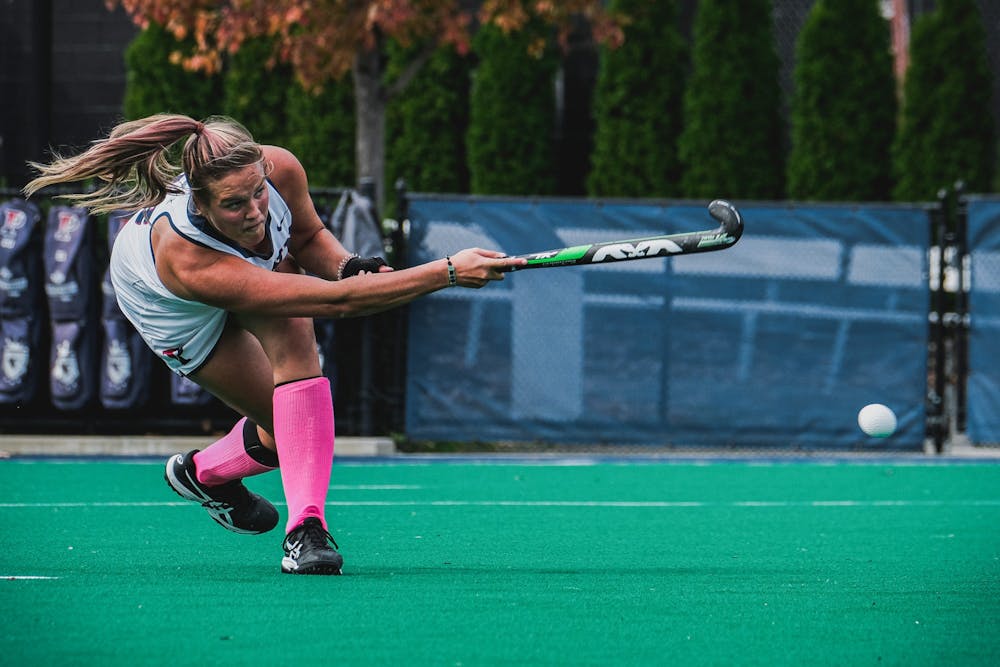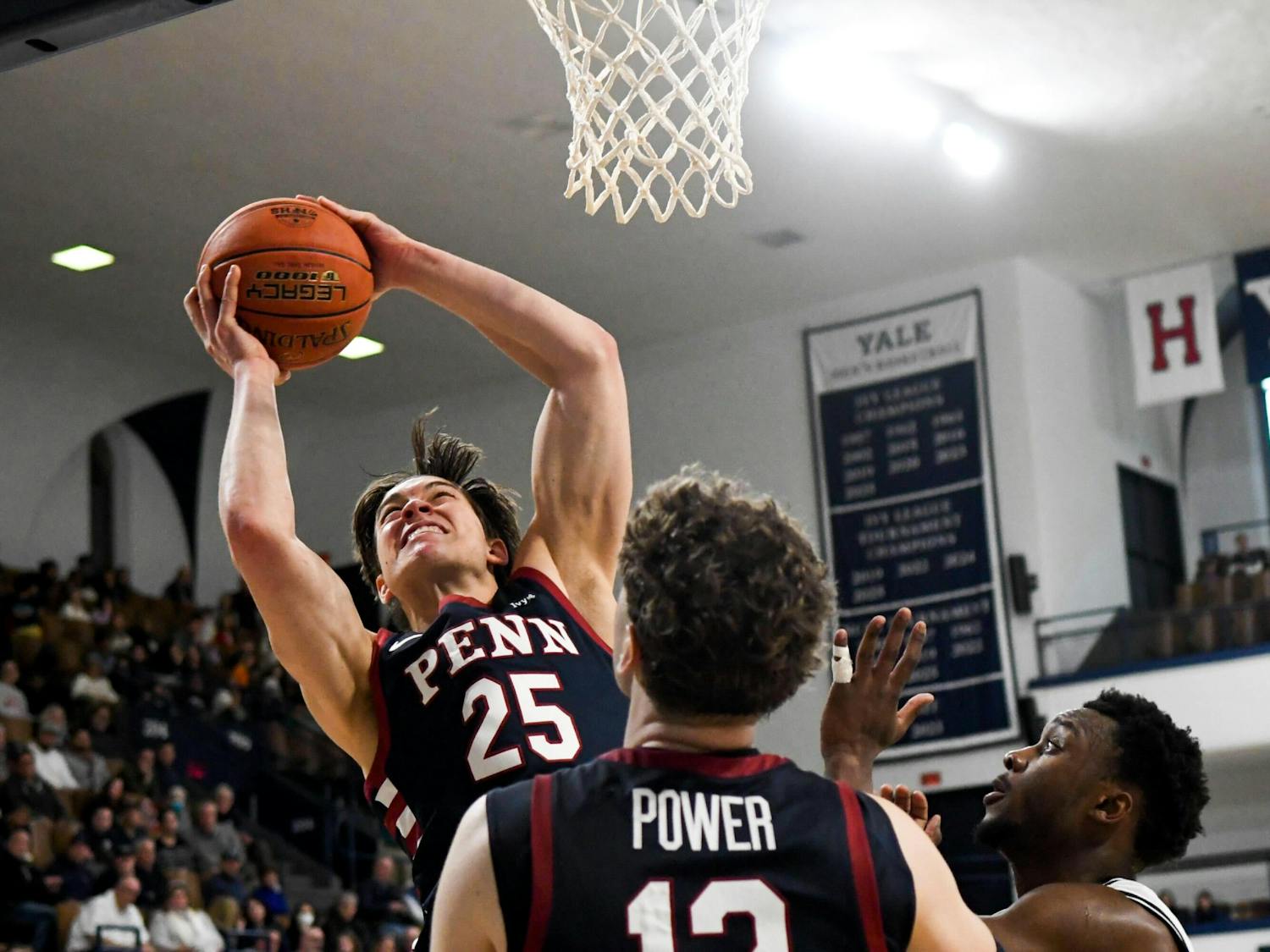Coming to Penn from South Africa gave Elita van Staden the chance to be a trailblazer for Penn field hockey. It also means that she has to watch out for lions.
In her freshman year with the Quakers, van Staden proved herself to be one of the most valuable players on the team. She received second team All-Ivy recognition, led the team in both goals and points, and ranked sixth in the Ivy League with 12 points in conference play.
Now a sophomore, van Staden’s addition to the team seems obvious, but the decision to continue playing field hockey, much less come to America, was not at all a foregone conclusion. In the transition between her sophomore and junior years of high school, van Staden had to choose between continuing with track, where she ran the 400-meter hurdles, or focusing on field hockey.
“I broke my one foot doing 400-meter hurdles, and it kind of made my decision for me,” van Staden said.
van Staden had remarkable success in South Africa after focusing on field hockey. She was a four-year team captain in her high school, with her team becoming two-time South African National Champions.
Outside of her high school career, van Staden was selected for both the U-16 and U-18 South Africa Junior National Women's Teams. In her final year with the national team, South Africa faced Australia for a three-day test series. For the first time in 16 years, South Africa came out victorious.
The thought of attending an American university hadn’t crossed van Staden’s mind until her senior year of high school, two years later than most athletes begin the recruitment process. Ultimately, it was her father who encouraged her to look into American universities, and in March of her senior year, van Staden was able to visit various schools in person.
“I was at Penn during one of the worst snowstorms — one of those Northeastern snowstorms — but I was in love with the campus, and the coaches, and the girls,” van Staden said. “Everything about it was just amazing, and because Penn is such a good university, it made sense for me to come to the U.S.”
RELATED:
Penn field hockey using 'shared experiences' to remain connected during pandemic
Two years after graduating, Penn field hockey legend Alexa Hoover isn't done yet
van Staden’s parents have played a large part in her development as an athlete, beyond simply helping her decide on an American university. Her father was a rugby player, and her mother was a provincial field hockey player. After retiring from field hockey, her mother became a field hockey coach, serving as van Staden’s coach until high school. She is also the reason why van Staden plays field hockey.
“I actually started playing field hockey when I was four years old because my mom was putting a stick in my hand and telling me to go, teaching me the ropes and everything,” van Staden said, laughing.
After her decision, South Africa’s victory over Australia became the perfect end to van Staden’s South African field hockey career. She became only the second international student to come play field hockey at Penn, after junior goalkeeper Sarah Lavers, who hails from England.
“Frankly, we’ve only recruited two international players going into this incoming class,” head coach Colleen Fink said. “Prior to [this year], Sarah Lavers and [van Staden] were really our two first international students.”
Penn, unlike other Ivy League field hockey programs like Harvard, does not have any coaches who come from outside the United States. But Penn’s lack of experience with international field hockey was not at all a deterrent for van Staden; instead, it became an extra reason to join the Quakers.
“That actually, I think, made my decision for me. I was so excited to start something new, be completely different,” van Staden said. “A lot of other colleges that I visited have recruited a lot of international players, and that would’ve been fun as well, but it’s been so great for me getting to know American culture, American field hockey, and American coaches.”
The weather in Philadelphia was in sharp contrast to that in South Africa. Philadelphia summers were hotter than expected, while the winters were much colder than anything van Staden had ever experienced.
van Staden also feels that the American style of field hockey tends to be more physical, while South African field hockey is more skill-based. But van Staden has taken little time to become adjusted to American field hockey, as her statistics from her debut year suggest.
“She’s coming off of a foot injury from two years ago that held her back from the earlier part of the last fall in her freshman campaign,” Fink said. “As she acclimated to our style of play and the style in the U.S., she was really able to capitalize. She’s transitioned very well to Penn and our team.”
Fink also praised van Staden for her competitiveness and accountability within the locker room, not just her contributions on the field.
“She prides herself on a standard that she has set for herself and is very strong in holding others accountable because she holds herself to a high standard as well,” Fink said. “Off the field, she just has the best personality. She’s funny, she’s charming, [and] she’s got that devilish twinkle in her eye that I’ve come to love. She’s just a fantastic person, and I’m so happy she’s a part of our team.”
While van Staden was one of the first international students to come to Penn for field hockey, she has already been able to use her experience to help others. This year, three international students were recruited to the team, one from Canada and two from the Netherlands.
“I’ve actually spoken to the girls coming from the Netherlands. I already love them so much. They’re so cool,” van Staden said. “I love that I get to be the first person and help them through their transition, coming in from a foreign country.”
An easy transition becomes especially crucial during the current pandemic. van Staden is in South Africa for the fall semester, with a time difference of six hours. Over the course of the summer, she kept in contact with the team through FaceTime and weekly Zoom meetings, but often she had to miss certain meetings because they were too late in her time zone.
Training has also been complicated. van Staden has a gym in her house, so she can do cardio and strength training. She has also taken up some boxing classes, but it’s difficult for her to do stick work while at home.
And as for the lions: “I actually live in a big game estate, so I can’t go running because there are lions and leopards and stuff,” van Staden said.
For van Staden, transitioning from South Africa to America — as if it wasn’t difficult enough — has also been complicated by a global pandemic that has kept her in South Africa for the time being. Nonetheless, her arrival and immediate impact at Penn in only one year’s time has been impressive.
With the slow and steady inclusion of more and more international students following her recruitment, van Staden has already begun, as she desired, to create something new. And as only a sophomore, she’s just getting started.









